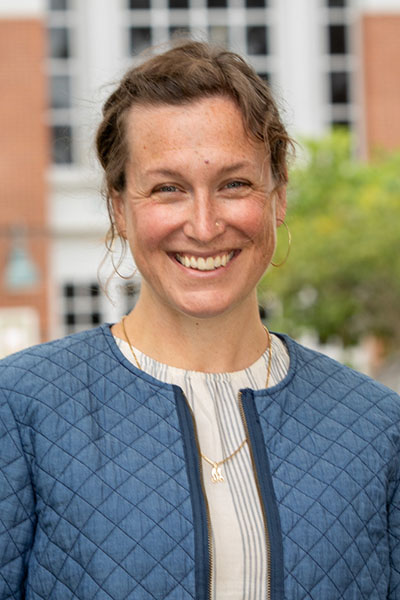- Apply
- Visit
- Request Info
- Give
Stanton to serve as co-principal investigator on new HIV/AIDS research
Elton John AIDS Foundation provides grant funding
Written by Lucinda Weiss
Published on August 30, 2023

Improving the HIV epidemic response in the South is the aim of a new grant-funded project that Eastern Connecticut State University faculty member Megan Stanton will work on as the co-principal investigator. Stanton is an expert on HIV treatment in the southern states and her research and published articles are helping inform the field.
The three-year project starts this fall and will involve refining trauma-based interventions at five medical clinics in Texas that treat HIV/AIDS patients. Stanton, assistant professor of social work, will direct the evaluation of how well the interventions work in her position as director of research and evaluation at the SUSTAIN Center at the University of Houston’s Graduate School of Social Work, where the grant is based.
A “Breakthrough” grant from the Elton John AIDS Foundation provides $650,000 for the project -- $500,000 for intervention programming and $150,000 for evaluation. “Breakthrough” grants target the HIV epidemic in the South, which has 54% of all new HIV diagnoses in the United States and has many of the priority jurisdictions identified by the Centers for Disease Control and Prevention for ending the epidemic.
The SUSTAIN researchers will work with five clinics that serve HIV patients to reduce trauma in treatment, and the project will train workers at the clinics to train others in trauma-reducing practices.
HIV/AIDS patients may face trauma in their lives that affects their ability to find and accept treatment, Stanton noted. Traumas experienced could be sexual or domestic violence, a natural disaster or the effects of racism and sexism, she said. Trauma also could stem from the diagnosis itself, if it is delivered in an unsupportive way that causes stress.
Trauma can interrupt a patient’s willingness to make appointments and go for treatment, she explained. Yet HIV treatment is highly effective at reducing the virus that causes AIDS, and “If you’re undetectable, you won’t transmit the virus,” she said.
Rather than focusing on individuals, the project focuses on ways that organizations can make patients feel safe and welcome. It involves intense training at clinics and follow-up coaching of staff.
It's important that HIV/AIDS patients who have experienced trauma feel that they have a choice in their treatment and that they do not feel trapped or coerced, Stanton said. Changes at a clinic can be as simple as installing better lighting so that patients feel safe at their visits or using clear language and not stigmatizing patients, who are already often marginalized as sex workers or drug users.
“It’s challenging to get people into care,” Stanton said.
The grant work is a continuation of work already undertaken in Texas by SUSTAIN and of Stanton’s work with SUSTAIN’s director, Samira Ali. Ali and Stanton started SUSTAIN with a $10 million COMPASS grant from Gilead Sciences, Inc., a biopharmaceutical company that supports HIV/AIDS programs around the world. The Gilead COMPASS Initiative is a 10-year, $ 100 million dollar investment made by the Gilead Foundation with the goal of ending HIV in the U.S. South.
Stanton serves on the leadership team for the overall COMPASS Initiative Impact Evaluation. The Journal of Healthcare for the Poor and Underserved is a peer-reviewed journal published out of Meharry Medical College that focuses on health inequities research. This August, they published a Supplemental Issue on the Gilead COMPASS Initiative, and Stanton co-authored four of the journal’s articles. In addition to reviewing the COMPASS Initiative’s goals, Stanton and her co-authors identified strategies being used at the SUSTAIN Center to support health equity; examined the use of Gender Affirmative care in the South; and presented data from a unique intervention to support Black staff and clients, who face structural racism in the medical setting.
The South as a hotspot of the epidemic can be traced to a lack of investment in robust health care – Louisiana is the only southern state to expand Medicare coverage, Stanton indicated. It is also a region where stigma is often attached to HIV and where anti-transgender feelings and racism are prevalent. Yet there are “a lot of amazing grassroots organizations in the South” that are trying to change this, she said.
Stanton will work remotely from Eastern for most of the project.


